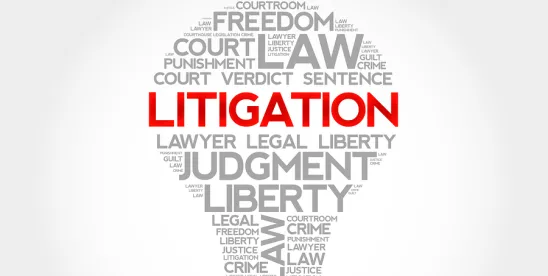Although it stopped short of declaring New Jersey a “Daubert jurisdiction,” the New Jersey Supreme Court recently issued a landmark decision reinforcing the “rigorous” nature of the “gatekeeping role” that trial courts are required to perform when assessing the reliability and admissibility of scientific causation evidence under New Jersey Rules of Evidence (“N.J.R.E.”) 702 and 703.[1] The Court’s decision, In re Accutane Litig., 191 A.3d 560 (N.J. 2018), provided New Jersey trial courts with “more clear direction” on “how the gatekeeping function is properly performed” and, for the first time, formally adopted the key “factors” recognized by the United States Supreme Court in Daubert v. Merrell Dow Pharmaceuticals Inc., 509 U.S. 579 (1993), as guideposts for evaluating the reliability of scientific evidence.[2] The Accutane decision represents an important development in New Jersey law that is likely to carry significant implications for companies facing mass tort and/or pharmaceutical litigation in New Jersey, particularly as trial courts begin to interpret and apply the decision in specific contexts and create precedent that will likely have a long-lasting impact on future litigation.
I. NEW JERSEY’S EVOLVING STANDARD FOR THE ADMISSIBILITY OF SCIENTIFIC EVIDENCE
Until the New Jersey Supreme Court’s Accutane decision, the standard governing the admissibility of expert scientific testimony under New Jersey law was as well-established as it was unclear. While New Jersey had been proudly “in the vanguard of courts to be persuaded” that adherence to the traditional “general acceptance” test under Frye v. United States, 293 F. 1013 (D.C. Cir. 1923), was “unsatisfactorily constricting,” it has also been among the minority of states which declined to expressly adopt the superseding standard established by the United States Supreme Court in Daubert.[3] Over two decades ago the New Jersey Supreme Court explained that “a theory of causation that had not yet reached general acceptance in the scientific community” could be found “sufficiently reliable if it is based on a sound, adequately-founded scientific methodology involving data and information of the type reasonably relied on by experts in the scientific field.”[4] As a practical matter, this relaxed standard resulted in a great deal of uncertainty and litigants often found that courts would decline to venture beyond a surface level examination of whether the expert had offered some “plausible scientific explanation[]” for his or her conclusions and “relied on the types of data and information reasonably relied on by comparable experts in the scientific field[.]”[5]
Under Daubert, however, courts are mandated to conduct a rigorous “preliminary assessment of whether the reasoning or methodology underlying the [expert’s] testimony is scientifically valid and ... can be applied to the facts in issue.”[6] To aid courts in carrying out this analysis, Daubert also recognized a non-exhaustive list of factors to serve as guideposts when assessing the validity and reliability of scientific expert testimony.[7] These factors included (1) whether the scientific theory can be, or at any time has been, tested; (2) whether the scientific theory has been subjected to peer review and/or other publication; (3) whether there is any known or potential rate of error and whether there exist any standards of maintaining or controlling the technique’s operation; and (4) whether there does exist a general acceptance in the scientific community about the scientific theory.[8]
II. IN RE ACCUTANE LITIGATION: NEW JERSEY ADOPTS THE DAUBERT FACTORS
On August 1, 2018, the New Jersey Supreme Court decided In re Accutane Litigation. In its opinion, the Court attempted to resolve the uncertainty left in the wake of its previous decisions, and also considered whether to formally adopt the Daubert “factors” as guideposts for courts to employ when evaluating the reliability of scientific evidence under New Jersey law.[9] The Accutane case involved claims by more than two thousand plaintiffs alleging that the drug Accutane caused them to develop Crohn’s disease.[10] The crux of the dispute before the Supreme Court was the question of whether the plaintiffs’ expert medical causation testimony was scientifically invalid, and thus inadmissible, under N.J.R.E. 702 and 703.[11]
Specifically, the plaintiffs proffered testimony from two expert witnesses―Dr. Arthur Asher Kornbluth (a gastroenterologist) and Dr. David Madigan (a statistician).[12] Both experts opined that the series of epidemiological studies cited by the defendants, which showed no causal relationship between Accutane and Crohn’s, were flawed in various respects.[13] Dr. Madigan’s testimony focused exclusively on alleged flaws in the statistical methodology of the defendants’ epidemiological research. Dr. Kornbluth went a step further and posited that there was a causal relationship between Accutane and Crohn’s disease. He reached this conclusion based on his assessment of other (non-epidemiological) forms of medical evidence, such as case reports, animal studies, a portion of one unpublished epidemiological study (the conclusions of which he disputed), and his own novel and non-peer reviewed biological mechanism hypothesis.[14] The defendants moved to exclude the testimony of both experts, arguing that their methodology was “internally-inconsistent,” “outcome-driven,” “selectively applied,” and thus unable to survive basic scientific scrutiny.[15]
After conducting an extensive evidentiary hearing, the trial court agreed with the defendants and excluded both experts’ testimony as unreliable. The trial court determined that the experts’ methodology was “unsound,” because they “did not interpret the relevant data and apply it to the facts of this case as would other experts in the field.”[16] Instead, the court found them to be “self-validating expert[s]” who had declined to subject their ideas to evaluation by the scientific community, “either through peer review submission or through the scrutiny of the process of publication in scientific literature.”[17] Furthermore, according to the trial court, Plaintiffs’ experts “want[ed] to have it both ways” by “cherry-pick[ing] evidence supportive of their opinion while dismissing other, better forms of evidence that did not support their opinion.”[18] Among other things, the trial court noted that many of the same methodological flaws that the experts cited to justify disregarding the existing epidemiological literature―namely, issues with study size, the reliance on patient questionnaires, and study length (in light of the characteristics of Crohn’s disease)―were also present, to a far greater degree, in the case studies and animal research that the experts unflinchingly relied on to form their own conclusions.[19]
On appeal, the New Jersey Appellate Division reversed the trial court; concluding that the defendants’ experts had merely “interpret[ed] the epidemiological studies differently” than the plaintiff.[20] After first concluding that it owed “somewhat less deference [than usual] to a trial court’s determination” regarding expert testimony, the panel found that the plaintiffs’ experts had “relied on methodologies and data of the type reasonably relied upon by comparable experts” and had disregarded the contrary epidemiological consensus cited by the defendants based on types of study design flaws “recognized in the scientific community as capable of producing unreliable results.”[21] Because the experts had articulated “valid reasons” for rejecting the studies they disregarded, and for accepting those they relied on, the Appellate Division held that their conclusions were sufficiently sound to satisfy what it described as the “relaxed standard” governing the admission of expert evidence. A mere “difference of opinion between the experts,” the panel explained, did not establish “that [the] plaintiffs’ experts failed to rely upon a sound methodology.”[22]
The defendants appealed. The New Jersey Supreme Court granted certification and subsequently reversed the Appellate Division. In its opinion, the Supreme Court declared the trial court’s decision to exclude the experts’ testimony to be “unassailable” under prevailing law.[23] The Court explained that the Appellate Division had applied an insufficiently deferential standard of review, and that there was, in fact, “ample evidence in the record” supporting the trial court’s determination that the plaintiffs’ experts “deviated from core scientific principles and strayed from their own claimed methodology in order to reach their conclusions.”[24[ Thus, the Court held that a proper analysis of the record led to the “clear result” that “the trial court properly excluded [the] plaintiffs’ experts’ testimony.”[25]
More importantly, the Court recognized that it was necessary to provide “more clear direction to courts on how the gatekeeping function is properly performed.”[26] The Court added that it would “reconcile [its] standard under N.J.R.E. 702, and relatedly N.J.R.E. 703, with the federal Daubert standard to incorporate its factors for civil cases.”[27] The Court explained that there was “not much light” between a proper understanding of New Jersey’s standard and “that which has developed in the federal sphere under Daubert’s initial instruction.”[28] Specifically, the Court noted that both New Jersey law and the Daubert standard “are aligned in their general approach to a methodology-based test for reliability.” The New Jersey standard and Daubert both ask “whether an expert’s reasoning or methodology underlying the testimony is scientifically valid,” and that “both standards look to whether that reasoning or methodology properly can be applied to [the] facts in issue.”[29] Given these similarities, the Court was “persuaded that the factors identified originally in Daubert”―namely the (1) testability, (2) peer review, (3) error rate, and (4) general acceptance―“should be incorporated for use by [New Jersey] courts.”[30] These factors, the Court explained, “dovetail with the overall goals of [New Jersey’s] evidential standard and would provide a helpful […] guide for [] courts to consider when performing their gatekeeper role concerning the admission of expert testimony.”[31]
The Court also clarified that “[d]ifficult as it may be, the gatekeeping role must be rigorous” and explained that while “the trial court should not substitute its judgment for that of the relevant scientific community,” the court’s proper “function is to distinguish scientifically sound reasoning from that of the self-validating expert, who uses scientific terminology to present unsubstantiated personal beliefs.”[32] This means that, before permitting expert causation testimony to reach a jury, the court is required to conduct a “robust analysis of the methodology advanced” to determine whether the expert has “demonstrate[d] the validity of his or her reasoning.”[33] Where a trial court determines that an expert has “applied a contradictory and selective form of reasoning” to reach his or her conclusions, those conclusions “should not be allowed to be advanced before a jury.”[34]
Applying this standard to the Accutane case, the Supreme Court concluded that the trial court had properly performed its “rigorous” gatekeeping role and correctly concluded that plaintiffs’ expert testimony should be excluded. The Court noted that plaintiffs’ experts had “employed a methodology whereby they disregarded eight of nine epidemiological studies and relied on case reports and animal studies to support their opinion.”[35] While the Court was careful not to “suggest that animal studies and case reports can never be relied upon for forming an opinion on causation,” it found “ample support for the trial court’s determination that it was not proper to do so here in light of the uniform body of epidemiological evidence” and the “recognized hierarchy of evidence […] accepted generally in the scientific community.”[36]
In light of the “many contradictions in the experts’ methodology,” the Court concluded that the trial court had properly held that “experts in the scientific community would not accept as consistent with scientific norms a methodology such as that used by plaintiffs’ experts.”[37] The Court noted that “many other courts” outside of New Jersey had concluded, “that experts cannot selectively choose lower forms of evidence in the face of a large body of uniform epidemiological evidence.”[38] Accordingly, when applying the appropriate “abuse of discretion” standard of review, the Court determined that it was not only permissible but “unsurprising” that the trial court had “deemed [the experts’] testimony to be unreliable and excluded it from being presented.”[39]
III. FUTURE IMPLICATIONS: APPLYING THE DAUBERT FACTORS IN NEW JERSEY CIVIL CASES
Although the Accutane Court stopped short of declaring New Jersey a “Daubert jurisdiction,” it left “little distinction between Daubert’s principles regarding expert testimony and [its] own.”[40] Additionally, the Accutane decision has now clarified that New Jersey trial courts are obliged to rigorously assess “both the methodology used by [an] expert to arrive at an opinion and the underlying data used in the formation of the opinion.”[41] In sum, Accutane represents a significant victory for evidence-based science and a sea change toward more active and rigorous scrutiny of novel causation methodologies in the New Jersey courts.
To preserve this victory moving forward, litigants facing mass tort claims involving products ranging from asbestos to pharmaceuticals must remain particularly vigilant against efforts by plaintiffs to minimize Accutane’s implications or drive a wedge between New Jersey’s analysis of scientific causation evidence and the rigorous scrutiny required under Daubert. For example, defendants facing any type of mass tort or products liability claim in New Jersey can draw cautionary lessons from the long-running history of asbestos litigation. In such cases, defendants have often succeeded in wielding the Daubert factors to exclude scientifically questionable causation opinions in federal court (where Daubert is meticulously applied),[42] but have struggled to achieve similar success in state courts, where a more relaxed form of Daubert is often applied.
To avoid similar issues under New Jersey’s newly clarified standard, defendants must be proactive in arguing for a precise interpretation of Accutane now, lest they be forced to litigate under a plaintiff-friendly re-interpretation of Accutane later. The first trial court decisions interpreting and applying the Accutane decision are likely to have a long-lasting impact in related litigation.[43] Accordingly, any defendant facing mass tort or products liability claims based on novel scientific causation evidence should insist on rigorous gatekeeping by the trial court, and be prepared to educate courts unfamiliar with the reinvigorated and “robust” analysis required by the New Jersey Supreme Court. Defendants should also encourage trial courts to expressly rely on the newly adopted Daubert factors to guide their analysis of scientific causation testimony. Systematic application of these factors will help to ensure that all key aspects of scientific reliability ― testability, peer review, error rate, and general acceptance ― are thoroughly assessed before plaintiffs are permitted to present novel science to a jury.
NOTES:
[1] In re Accutane Litig., 191 A.3d 560 (N.J. 2018).
[2] Id. at 589, 594.
[3] Id. at 583, 588.
[4] Rubanick v. Whitco Chem. Corp., 125 N.J. 421, 449 (1991).
[5] In re Accutane Litig., 451 N.J. Super. 153, 199, 165 A.3d 832, 859 (App. Div. 2017), rev'd, 234 N.J. 340, 191 A.3d 560 (2018).
[6] Daubert v. Merrell Dow Pharm., Inc., 509 U.S. 579, 592-93 (1993).
[7] Daubert, 509 U.S. at 592-95.
[8] Id.
[9] In re Accutane Litig., 191 A.3d at 593.
[10] Id. at 566.
[11] Id. at 566‒67.
[12] Id. at 570.
[13] Id. at 570‒75.
[14] Id. at 570‒73.
[15] Id. at 580‒81.
[16] Id. at 564‒64.
[17] Id. at 579.
[18] Id.
[19] Id. at 581, 592.
[20] Id. at 579.
[21] Id.
[22] Id.
[23] Id. at *593.
[24] Id.
[25] Id. at 564.
[26] Id. at 589.
[27] Id. at 564.
[28] Id. at 593.
[29] Id. at 594.
[30] Id.
[31] Id.
[32] Id.
[33] Id. at 590.
[34] Id. at 581, 590.
[35] Id. at 591.
[36] Id. at 592.
[37] Id.
[38] Id. at 592.
[39] Id. at 593.
[40] Id. at 564, 594.
[41] Id. at 593.
[42] See, e.g., Haskins v. 3M Co., No. 2:15-cv-02086, 2017 WL 3118017 (D.S.C. July 21, 2017); Krik v. Crane Co., 76 F. Supp. 3d 747, 753 (N.D. Ill. 2014); Scalafini v. Air & Liquid Sys. Corp., No. 2:12-CV-3013-SVW-PJW, 2013 WL 2477077, at *4-5 (C.D. Cal. May 9, 2013); Bell v. Foster Wheeler Energy Corp., No. 15-16394, 2016 WL 5847124 (E.D. La. 2016); Barabin v. Scapa Dryer Fabrics, Inc., No. C07-1454JLR, 2018 WL 840147, at *12 (W.D. Wash. Feb. 12, 2018).
[43] Early indications suggest that Accutane is already heralding in an era in which New Jersey trial courts will be afforded the discretion to rigorously assess the reliability and admissibility of proffered expert testimony. In the first New Jersey appellate decision to cite Accutane, the Appellate Division summarily affirmed a tax court’s decision to exclude an expert’s “cost approach to valuation” from consideration based on the trial court’s determination that the expert’s methodology was “serious[ly] flaw[ed].” Palisadium Mgmt. Corp. v. Borough of Cliffside Park, 193 A.3d 339, 341‒342 (N.J. App. Div. 2018) (citing In re Accutane Litig., 191 A.3d 560 (N.J. 2018)). In affirming this decision, the Appellate Division cited Accutane and explained that “[a]s the Court has recently reminded, we review a trial court's decision ‘to exclude expert testimony on unreliability grounds’ only for abuse of discretion.” Id.; see also New Jersey Div. of Child Prot. & Permanency v. V.F., No. A-1343-17T1, 2019 WL 272923, at *4 (N.J. Super. Ct. App. Div. Jan. 22, 2019) (noting that Accutane adopted Daubert “with qualifications and caveats […] so that trial courts would generally follow a more stringent approach regarding the admission of scientific evidence in civil cases”).





 />i
/>i

